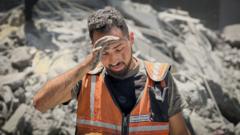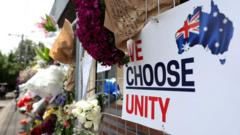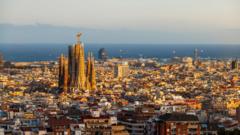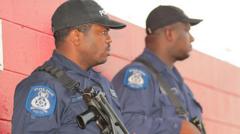In a remarkable story of resilience and recovery, Spanish police women are redefining their roles in aiding sex trafficking victims, focusing on long-term care goes beyond rescue.
Women of the Law: Reshaping Lives After Rescue from Sex Trafficking

Women of the Law: Reshaping Lives After Rescue from Sex Trafficking
Police officers in Spain forge lifelong bonds with survivors of human trafficking, providing holistic support and hope.
Cristina and Lidia are prominent figures in an elite unit of the Spanish police dedicated to fighting sex trafficking. Years ago, they rescued "Victoria" (a pseudonym), who had endured a harrowing ordeal in a sex trafficking ring. For three long years, she had lived under extreme physical and emotional abuse, sustaining her hope only through the dream of reuniting with her children.
The police operation that liberated her may have concluded, but the support from Cristina and her dedicated colleagues has remained a fundamental part of Victoria’s life. From emotional milestones, such as reuniting her with her children after years of separation, to more personal gestures like presenting her with a cake on her birthday, the bond they share runs deep.
On a crisp autumn day, Victoria moved to tears as she met her rescuers in a local park. Despite her smiles during the celebration and a newfound life's joy, she recalls her past as "tough." Victim of a violent childhood in Colombia—marked by the disappearance of her father and the rape of her sister—Victoria sought better opportunities in Spain, believing she had secured a job as a cleaner. Instead, she was ruthlessly thrust into a life of prostitution.
"I worked 24 hours a day," she reflects sadly, explaining how she had to sleep in full makeup and wear just underwear, always at the ready for the next client. The intricacies of her rescue remain undisclosed due to legal protections, but she vividly remembers the day she ran to the detectives, feeling hope for the first time: "I looked at them, hugged them and cried."
In collaboration with various organizations, Cristina and her team have assisted Victoria in obtaining psychological counseling, job-seeking support, and educational opportunities. Importantly, they worked tirelessly for months to ensure her children's safety, as the traffickers had threatened them if Victoria ever attempted to escape or inform the authorities. These traffickers had direct contact with her children and well-documented details about their lives.
Cristina's unit differs from typical crime-fighting entities. Using a victim-focused approach, they provide ongoing support to help survivors create stable lives after their ordeals. Often teased for their unique approach, Cristina remains steadfast in her belief that restoring hope is critical: "We believe in a social and humanitarian process that can restore hope in victims' lives, so they can truly recover and live passionately again."
Despite women comprising fewer than 10% of the Guardia Civil's overall officers, they represent 60% of Cristina's specialized team. Felix Duran, the unit head, prioritizes female recruitment, believing it fosters a safe space for victims, particularly young girls, to disclose their traumatic experiences.
The struggle against human trafficking is profound. Approximately 50,000 victims are detected globally every year, with a recent UNODC report highlighting a 25% rise in detected victims since the pandemic began due to increasing exploitation and forced labor. Spain serves as both a destination and transit country for numerous trafficking victims heading to Europe.
Reflecting on her time in captivity, Victoria articulates a painful truth: "I felt I was being abused in plain sight. Everyone knew." The escalating climate of human trafficking has forced more victims underground, complicating rescue efforts. Ilias Chatzis from UNODC warns that organized crime now often intertwines trafficking with other illegal activities, leading many victims to remain unnoticed.
Grateful for her relatively fortunate outcome, Victoria seeks to raise awareness for those still in bondage and articulates her gratitude for the second chance at life she has gained. She describes how police intervention healed her wounds and made it possible to embrace her children once more. "They gave me another chance not only to live, but to heal and hug my children again."
With a resilient spirit, Victoria embraces her newfound freedom each day, often reflecting, “I go out on the street and I breathe, and I say, 'my God, thank you, I'm alive.'” Cristina marvels at Victoria's strength: “She is an example of how you can survive and overcome such an ordeal.”
The annual BBC 100 Women series recognizes inspiring women worldwide, and Victoria's story is a testament to the power of hope and the transformational role of compassionate law enforcement. Viewers can engage further by watching the BBC 100 Women documentary "Raid on the Brothel Next Door" available on BBC iPlayer or on their YouTube channel.




















